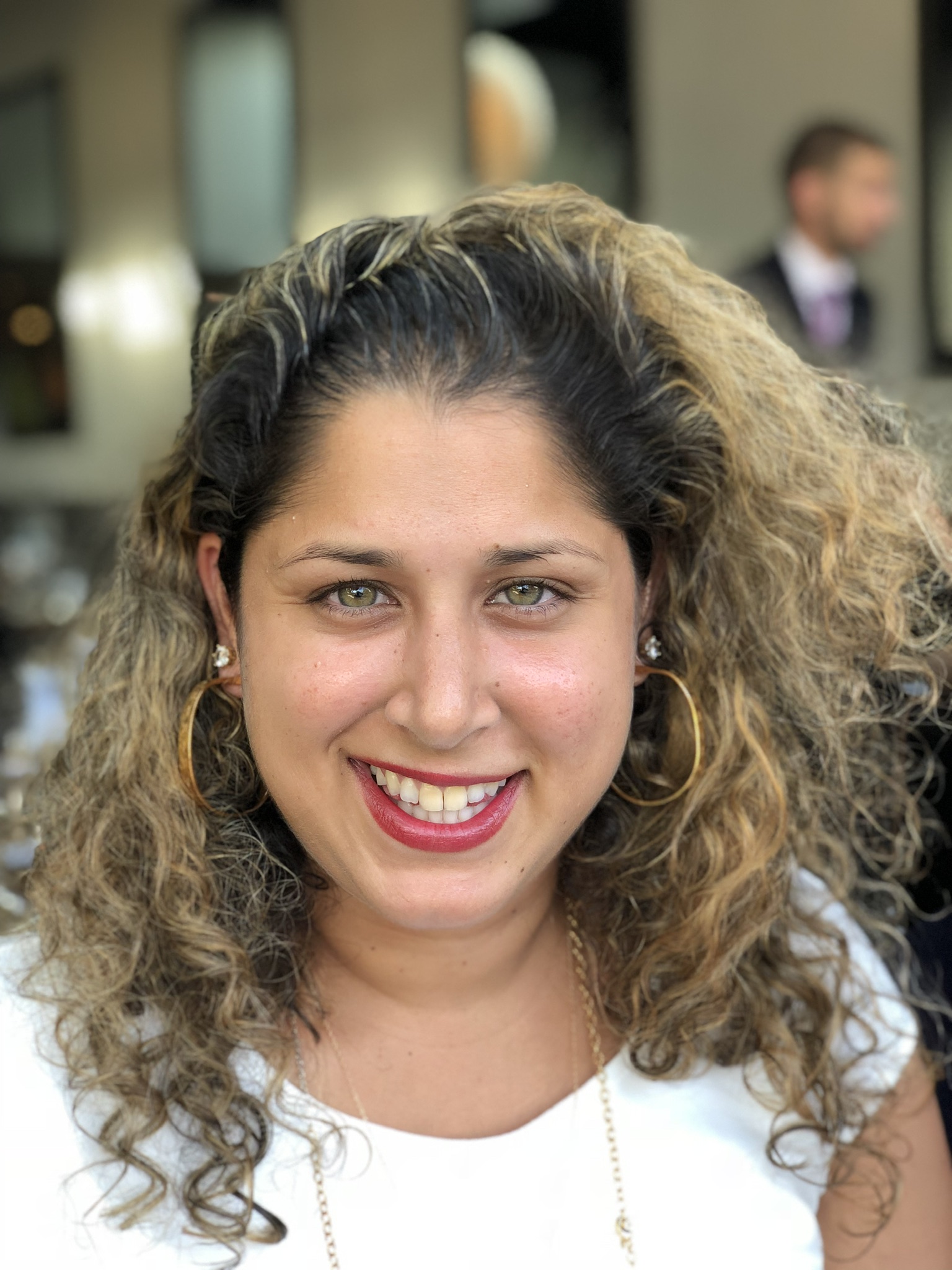


Best IVF Clinic San Francisco
Could Bay IVF Be the Best San Francisco Bay Area IVF Clinic for You?


Determining the “best” IVF clinic in the San Francisco Bay Area involves considering success rates, patient satisfaction, and the range of services provided.
Choosing a San Francisco Bay Area fertility clinic that resonates with your needs and goals is crucial for a successful and positive fertility journey.

Meet Your Bay IVF Team

With a focus on cutting-edge reproductive technologies, personalized treatment plans, and a patient-centric approach, Bay IVF has established itself as one of the best IVF clinics in the San Francisco Bay Area.
Our goal is to help you achieve the highest possible probability of pregnancy.
Our patients frequently commend Bay IVF for its supportive and inclusive environment, making it their best IVF clinic for navigating the complexities of IVF treatment in the vibrant and diverse San Francisco Bay Area.
We provide a highly supportive, stress-reducing, and caring environment in a non-hospital setting. If you have hesitated to consult an infertility specialist, our Clinic is the perfect choice for you!
You should be able to continue your everyday activities during your treatment.
Among the best IVF clinics in the San Francisco Bay Area, our Clinic is known for its excellent and discreet patient communication. You will always be kept informed about your testing and treatment progress.
Meet Your Doctor

- Dr. Polansky received his medical diploma from Charles University in Prague, the Czech Republic, in 1978.
- After completing his OB/GYN residency at Jewish Hospital in Saint Louis, MO, he graduated from the Reproductive Endocrinology and Infertility (REI) fellowship at Stanford University in 1985.
- In the same year, he co-founded the Stanford IVF Clinic.
- Dr. Polansky obtained board certification in Obstetrics and Gynecology in 1986 and became REI subspecialty board certified in 1988.
- In 1987, he left Stanford University and established Nova IVF.
- In 2011, he founded Bay IVF, where he provides advanced fertility treatments with a holistic approach, utilizing state-of-the-art techniques.
- Dr. Polansky personally performs ultrasound examinations, egg retrievals, embryo transfers, and ovarian and endometrial stimulations for his patients.
- He is deeply committed to his patients and is always ready to lend a helping hand.
Frank Polansky, M.D.

Bay IVF holds the following licenses and certifications

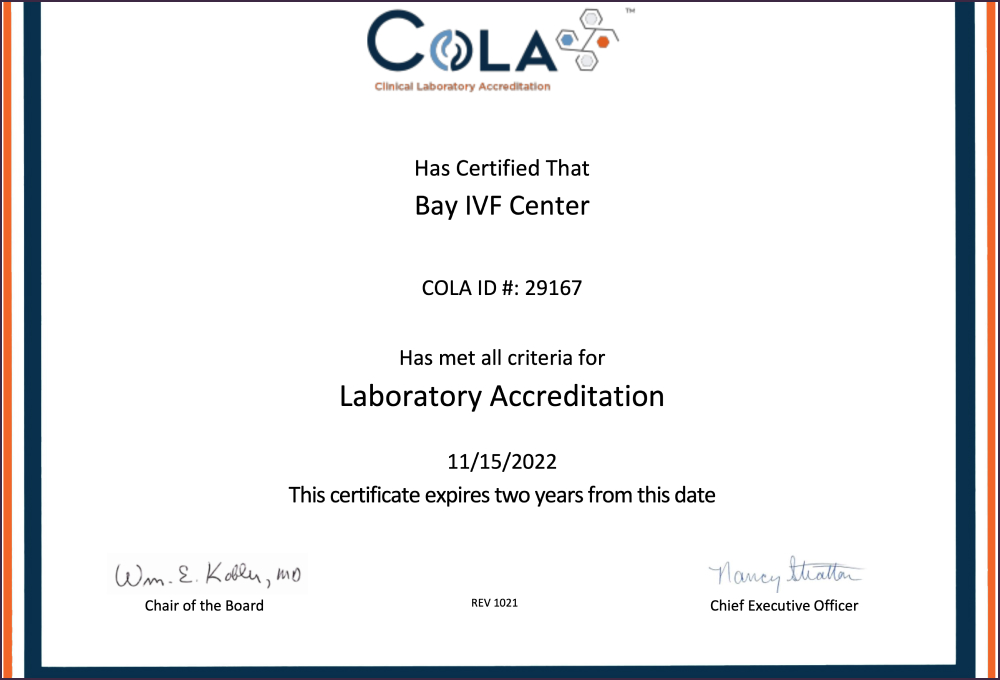
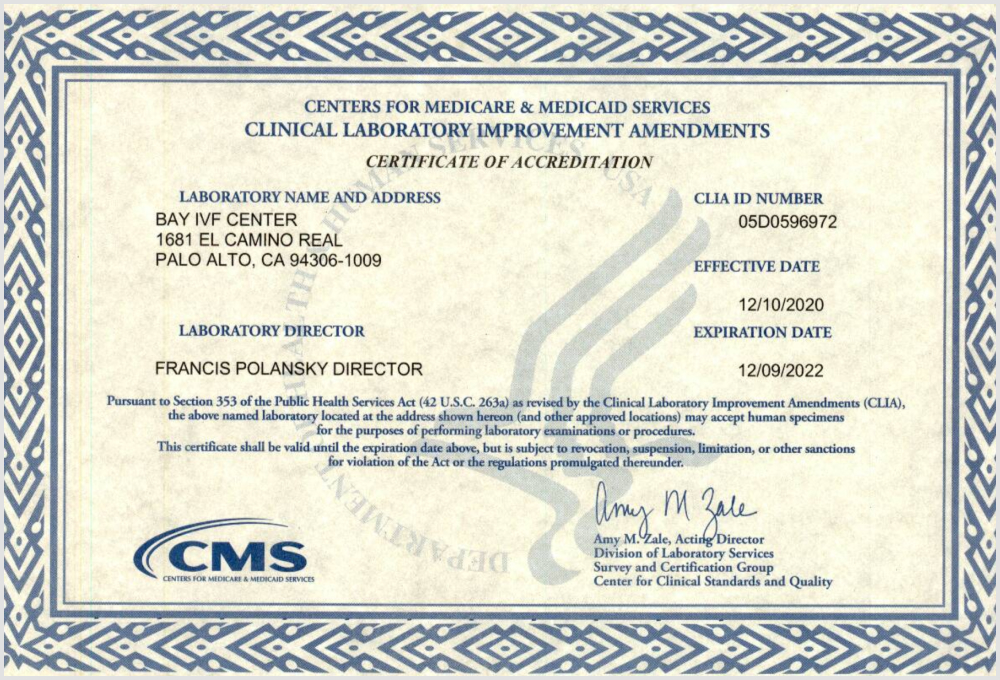
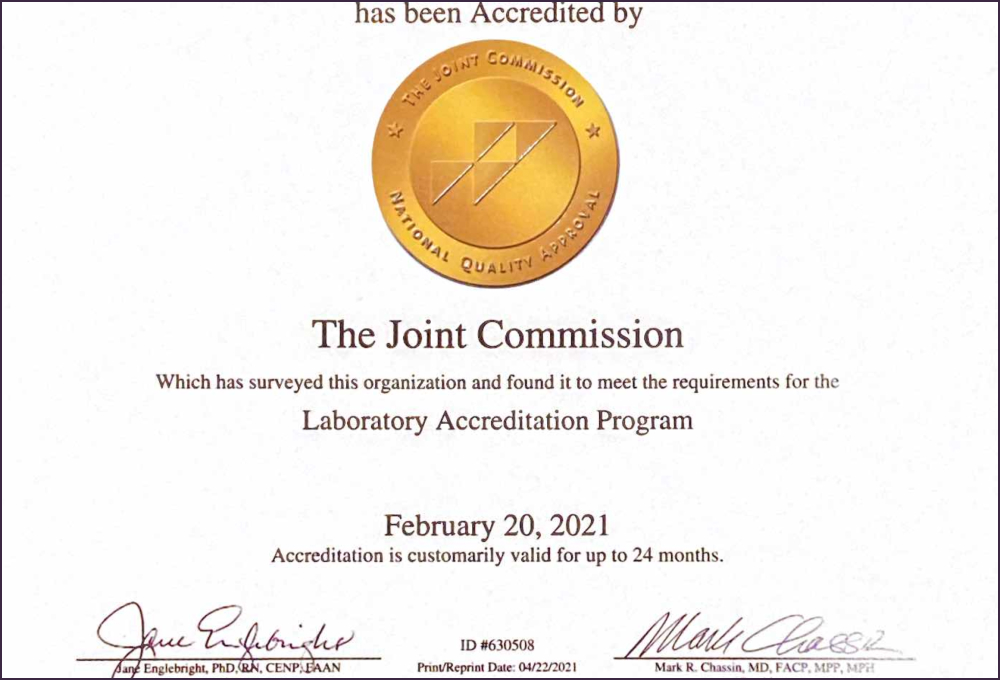



I feel privileged to be able to assist you in your journey to have a child. You will find me dedicated to you and your treatment. My team and I will spare no effort to make your treatment a success.
Frank Polansky, MDTreatments at Bay IVF
In Vitro Fertilization

In Vitro Fertilization
In Vitro Fertilization (IVF) is the most powerful treatment available to help infertile patients achieve pregnancy from their own eggs and sperm. IVF can also be an excellent test of egg and sperm quality.
We use gentle and individualized ovarian stimulation protocols prioritizing egg quality over quantity. This approach minimizes clinic visits and reduces the risk of ovarian hyperstimulation without compromising the chances of a successful outcome.
Most patients will be able to continue their everyday lifestyles during treatment. Our goal is to make your conception experience pleasant, relaxed, and as natural as possible.

Gender Selection

Gender Selection
We were one of the first fertility clinics in the San Francisco Bay Area to offer Gender Selection IVF.
IVF for Gender Selection uses a Pre-implantation Genetic Testing (PGT) procedure to determine the gender of each embryo.
Through this method, prospective parents will know the gender of each embryo with 100% accuracy before transferring them into the uterus.
The Gender Selection IVF procedure requires the creation of embryos and is, therefore, an extension of In Vitro Fertilization.

Reciprocal IVF
Reciprocal IVF
In reciprocal lesbian IVF, one partner assumes the role of the Genetic Mother by providing the eggs retrieved during the IVF cycle, while the other partner serves as the Birth Mother who carries the pregnancy.
The eggs obtained from the Genetic Mother are fertilized with donor sperm within a laboratory setting. Subsequently, the resulting embryos are transferred to the uterus of the partner who will carry the pregnancy.
This method enables both partners to actively participate in the creation and gestation of their child, fostering a deep sense of involvement and connection.

Egg Freezing
Egg Freezing
Egg freezing success rates are highly influenced by a woman’s age when the eggs are frozen. Ideally, eggs should be frozen before age 35 for the best chance of success. However, thanks to advancements in the procedure, egg freezing can still be a viable option for women past 35.
The process involves stimulating the ovaries to produce multiple eggs. These eggs are then retrieved, frozen using a special vitrification technique, and stored in liquid nitrogen.
It’s important to note that the chance of a successful pregnancy using frozen eggs hinges on the quality of the eggs at the time of freezing, not the woman’s age when they are thawed. Once thawed, the eggs can be fertilized with sperm, and the resulting embryos can be transferred to the uterus for implantation and, hopefully, pregnancy.

Pre-Implantation Genetic Testing (PGT)
Pre-Implantation Genetic Testing (PGT)
PGT can be added to IVF, Donor Egg IVF, and Embryo Banking treatments. It aims to increase the probability of a successful outcome by minimizing the likelihood of transferring genetically abnormal embryos.
Embryo genetic testing has been recommended for patients of advanced maternal age (35 or older), those with a history of repeated early pregnancy loss (three or more), and individuals who have experienced multiple failed IVF cycles despite the transfer of high-quality embryos.

Male Infertility
Male Infertility
Approximately 10% to 15% of men are born with some degree of male infertility, and about one-third of the time, a couple’s infertility can be solely attributed to male infertility.
In recent years, the chances of infertile men conceiving their genetic child have significantly improved. In situations where patients previously had to rely on donor sperm, we can now almost always utilize the partner’s sperm to fertilize the eggs with the intracytoplasmic sperm injection (ICSI) procedure.

Embryo Banking
Embryo Banking
Some couples may delay starting their family to the extent that when they finally decide to have children, it can be challenging, if not impossible, to conceive naturally.
Embryo Banking can be a valuable option for postponing parenthood while pursuing educational and professional goals.
Embryo Banking involves stimulating the development of several eggs, the retrieval of eggs from the ovaries, fertilization with the partner’s semen, cryopreservation of the resulting embryos, and their storage at our Clinic for future use.

Egg Donation
Egg Donation
Egg Donation can be a highly successful treatment used by patients who no longer have high-quality eggs.
Children conceived with the help of donor eggs are genetically linked to the male partner and the egg donor, while the female partner is the one who becomes pregnant, nourishes the baby throughout the pregnancy, and experiences childbirth.
You have the option to choose an egg donor from an egg donor agency or purchase frozen donor eggs from an egg bank.

Gestational Surrogacy
Gestational Surrogacy
There are numerous reasons why individuals and couples turn to gestational surrogacy. The most common are:
– Same-sex male couples
– Men who are single parents
– Women with previous hysterectomy
– Medical conditions making being pregnant too risky
The intended parents’ or donor eggs are fertilized with sperm through In Vitro Fertilization. The resulting embryo(s) are then transferred to the surrogate, typically only one at a time.
The Gestational surrogate carries the pregnancy and delivers the child.

Frozen Embryo Transfer
Frozen Embryo Transfer
Fertility treatments may involve embryo freezing and the storage of embryos in liquid nitrogen. Subsequently, the stored embryos can be thawed and transferred into the uterus.
The embryo cryopreservation, storage, and the Frozen Embryo Transfer procedure are done on-site at Bay IVF.
Frozen Embryo Transfer is very safe. Hundreds of thousands of babies have been born worldwide from cryopreserved embryos.

Sperm Aspiration IVF
Sperm Aspiration IVF
Some men either do not produce sperm at all or produce them in insufficient numbers and low quality.
Many of these men can have their sperm directly aspirated from their testicles or the epididymis (tightly coiled tubules attached to the top of the testes that store sperm before ejaculation).
The two most common indications for sperm aspiration are a previous vasectomy and the congenital absence of the epididymis.

Fertility Tests
Fertility Tests
Your reproductive history and the results of your testing will determine the most likely and cost-effective treatment for achieving pregnancy.
We plan your fertility testing based on three categories of infertility factors: (1) Male factor infertility, (2) Ovulation and egg quality disorders, and (3) Uterine and Fallopian tubes factors.
Whenever possible, we utilize fertility test results performed before you become a patient at Bay IVF to minimize your costs.



FAQ — Find Answers to Your Queries
Here are some of the most commonly asked fertility-related questions. A more comprehensive FAQ selection is available on the FAQ page.
Should we transfer one or two embryos?
About half of our patients transfer two embryos at a time, while the other half choose to transfer only one embryo in each transfer. We will always provide guidance, but you will have the final say in whether to transfer one or two embryos.
What is gender selection treatment?
Gender selection is an extension of IVF treatment that utilizes the Pre-implantation Genetic Testing (PGT) procedure to identify the gender of each embryo. With this method, prospective parents can know the gender of each embryo with 100% accuracy prior to transfer into the uterus.
I am from the LGBTQ+ community. Can I have my treatment at Bay IVF?
Yes! We take pride in being one of the first fertility clinics in Northern California to offer In Vitro Fertilization services for lesbian partners. Our clinic is LGBTQ+ friendly and experienced in both lesbian IVF and Reciprocal IVF.
Is the egg retrieval procedure painful?
Your egg retrieval should be a very comfortable experience, as we use effective pain and relaxation medications. Most patients will sleep through the 5-10 minute egg retrieval procedure, though some may experience mild menstrual-like cramping.
What is the IVF cut-off age?
The probability of a successful IVF treatment becomes exceedingly low by age 44. You must be 43 and 11 months or younger at the time your IVF treatment begins. Patients who are 44 and older should strongly consider Donor Egg IVF as the most effective treatment option to achieve a successful pregnancy.
I am over 44, but my ovarian reserve is very good. Can I do IVF treatment?
We have occasionally provided IVF treatment to women over the age of 44 when their antral follicle count and AMH results suggest that their eggs are biologically younger than their chronological age.
What are the BMI requirements?
Your BMI must be no greater than 31 for an adequate ovarian response and safety during the egg retrieval procedure. If your BMI is higher, please follow the IVF Diet and Lifestyle (PDF) recommendations as closely as possible. Doing so can help you achieve weight loss at an optimal rate, which could significantly improve your chances of a successful pregnancy.
Do you offer payment plans?
Our IVF Duo and IVF Trio Financial Plans can provide substantial savings compared with single-cycle IVF fees. Two- and three-cycle financial plans for Egg Freezing are also available.
Bay IVF has partnered with Future Family to offer accessible, personal, and affordable fertility care financing. Their mission is to make fertility care more accessible and affordable. Future Family loans are an alternative to high-interest credit cards and dipping into your savings. They offer 0% APR financing for those who are eligible, as well as low monthly payment plans. Prequalifying is risk-free, easy, and will not affect your credit score.


Prerequisites for IVF, Embryo Banking, and Gender Selection
Only a few treatment prerequisites are needed before the start of your treatment. They assess the egg and sperm quality and ensure that embryos can be accurately placed in a healthy uterus.
Female partner’s age
The likelihood of a successful IVF treatment significantly decreases by the age of 44. To be eligible for IVF treatment, you must be 43 years and 11 months or younger when your treatment begins. Patients who are 44 and older should strongly consider Donor Egg IVF as the most effective treatment option for achieving a successful pregnancy.
Female partner’s weight
For an optimal ovarian response and your safety during the egg retrieval procedure, it is important that your BMI is no greater than 31. If your BMI is higher, we recommend following the IVF Diet and Lifestyle (PDF) recommendations as closely as possible. By doing so, you can achieve weight loss at an appropriate rate, which may significantly enhance your chances of a successful pregnancy.
Pathogen testing
This testing is required by the State of California. You and your partner (if applicable) must be tested for Hepatitis B-Surface Antigen, Hepatitis C-Antibody, HIV I&II, HTLV I&II, and RPR.
Ovarian Reserve Assay (ORA)
ORA assesses the likelihood of producing normal-quality eggs. It involves measuring the levels of Follicle Stimulating Hormone (FSH), estradiol (estrogen, E2), and Anti-Mullerian Hormone (AMH) in the blood.
These test results provide insights into the quality of eggs and are utilized to optimize your ovarian stimulation.
Uterine measurement and saline ultrasound
Knowing the length of the uterus is essential for precise embryo placement. Saline ultrasound is performed to eliminate the presence of intrauterine polyps and fibroids.
Semen evaluation
The male partner’s semen will be assessed at the Bay IVF laboratory to determine the optimal method of semen preparation for IVF egg insemination.
Parents’ genetic testing (optional)
All prospective parents should consider genetic screening for hundreds of the most prevalent genetic diseases. Please inform us during your initial appointment at Bay IVF if you would like to have your blood sample sent for genetic screening.
IVF diet and lifestyle
Environmental factors can greatly influence reproductive health. We encourage you to review the IVF Diet and Lifestyle document (PDF) for a comprehensive list of requirements regarding reproductive health and a recommended source for dietary supplements.


Choosing the Best IVF Clinic in the San Francisco Bay Area
Unfortunately, there is no single “best” IVF clinic in the San Francisco Bay Area. The ideal clinic depends on your individual needs and priorities.
Factors to consider when choosing the best IVF Clinic in the San Francisco Bay Area
Success rates: While success rates aren’t a guarantee, they offer valuable insights into a clinic’s effectiveness. Look for San Francisco Bay Area fertility clinics that publish their success rates for IVF cycles based on your specific circumstances (age, diagnosis, etc.).
Clinic philosophy: Some San Francisco Bay Area clinics specialize in specific fertility issues or utilize a more holistic approach. Consider what’s most important to you.
Experience and expertise: Research the doctors’ qualifications and experience performing IVF procedures.
Cost and transparency: IVF treatment in the San Francisco Bay Area can be expensive. Compare pricing structures of various “best” clinics, considering medication costs and any additional procedures. Look for clinics with transparent pricing information.
Patient experience: Reading online reviews can offer insights into patient experiences. However, remember these reviews are subjective and don’t reflect everyone’s experience.
Location and convenience: Think about how far you’re willing to travel for appointments and how accessible the San Francisco Bay Area clinic is.
Additional resources in finding the best San Francisco Bay Area IVF clinic
The American Society for Reproductive Medicine (ASRM): Offers patient-focused information on infertility and fertility treatments: https://www.asrm.org/
American Society for Reproductive Medicine (ASRM): This professional organization offers a wealth of resources on infertility and IVF treatment. https://www.asrm.org/
FertilityIQ: Provides a search engine for finding fertility clinics and resources. https://www.fertilityiq.com/
Resolve: A national infertility support organization https://resolve.org/ offers resources and guidance for finding an IVF clinic.
Remember
Schedule consultations: Meeting with different San Francisco Bay Area IVF clinics allows you to ask questions, get a feel for the environment, and connect with the staff.
Advocate for yourself: Don’t hesitate to ask questions and voice your concerns during consultations.
By prioritizing your needs and carefully evaluating available options, you can find the best IVF clinic in the San Francisco Bay Area to help you achieve your family-building goals.

We look forward to meeting you at Bay IVF and, when your treatment is successful, celebrating your new pregnancy!
 +
+Years of Experience
 +
+Babies Born
 %
%Compassionate Care


Hear from Our Patients’ Journey to Parenthood at Bay IVF!

I would highly recommend Bay IVF for those wanting to build their family and needing IVF support! Dr. Polansky and the whole Bay IVF team were so supportive and welcoming while also honest and realistic. Our girl is our dream come true!
Jennifer C.-F.This clinic has been amazing to work with. All the nurses and staff made sure I was always comfortable and were there to answer questions any time I needed. We are incredibly grateful to Dr. Polansky and the team for everything they did for us.
Harpreet K.Words could never express the gratitude my husband and I will always have for Bay IVF! We did our research and decided to check out Bay IVF. We scheduled a consultation and felt an instant connection… love at first sight!
Chelsea L.
Bay IVF Early Pregnancy Heartbeat


Dr. Polansky’s Communication With Patients
Real texts, anonymous patient names
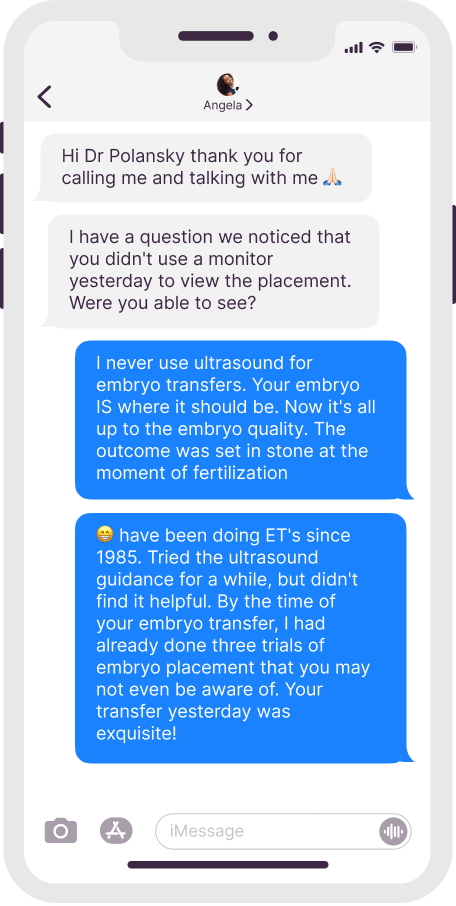
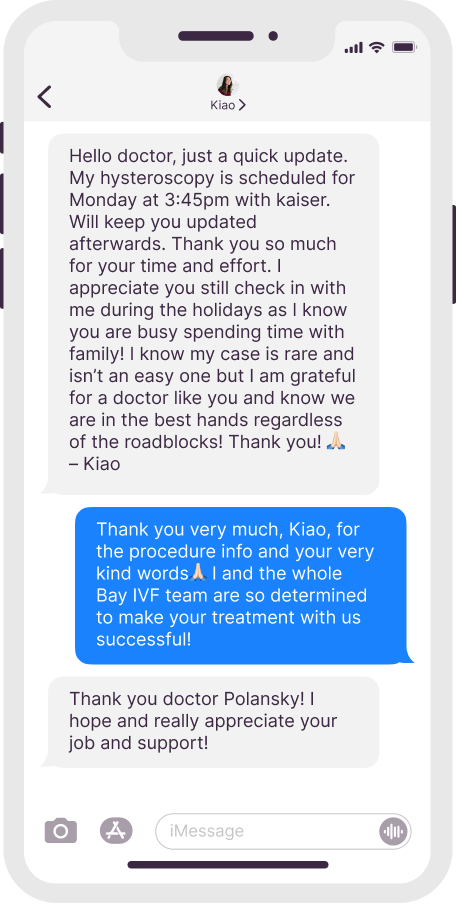
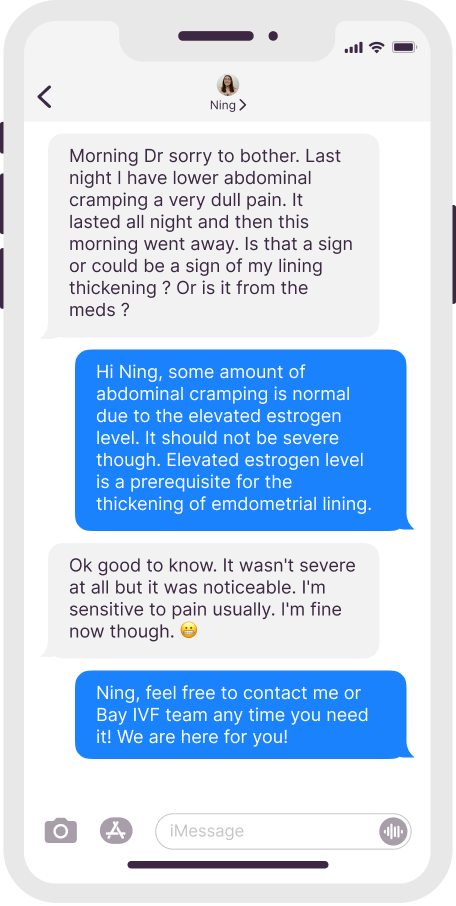
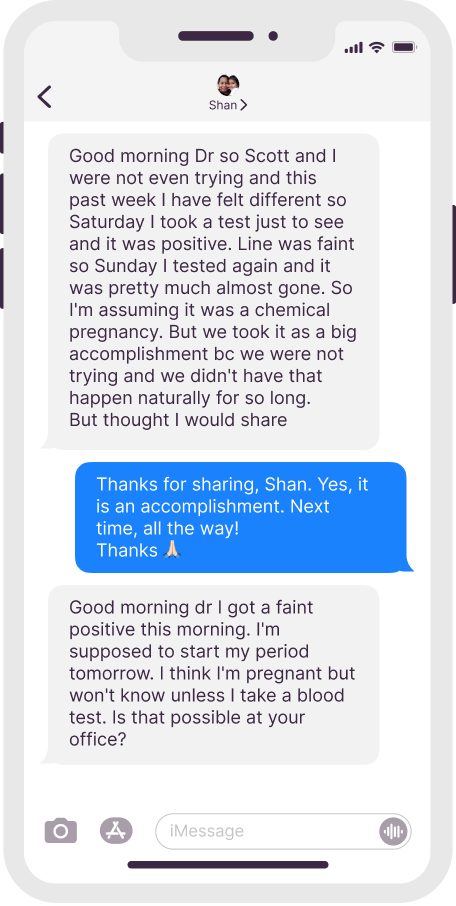
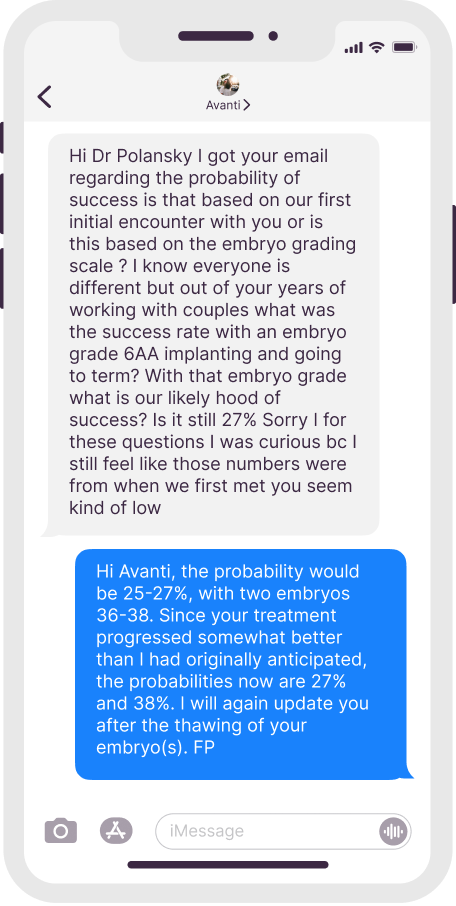
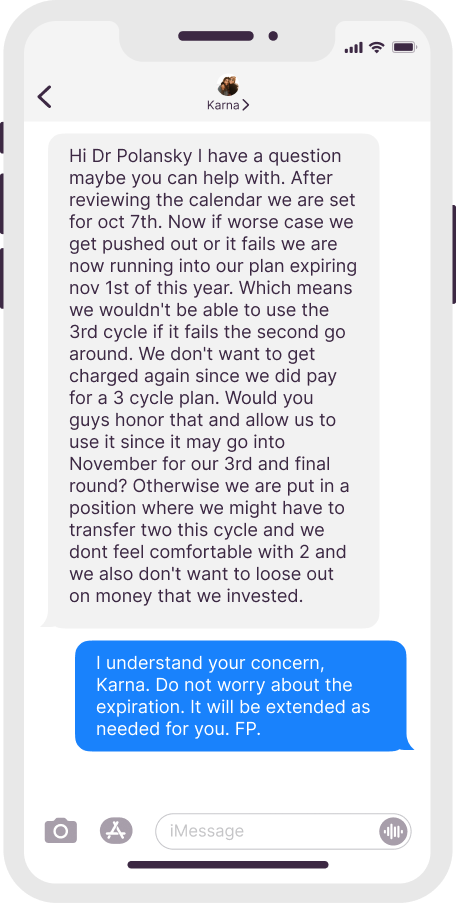
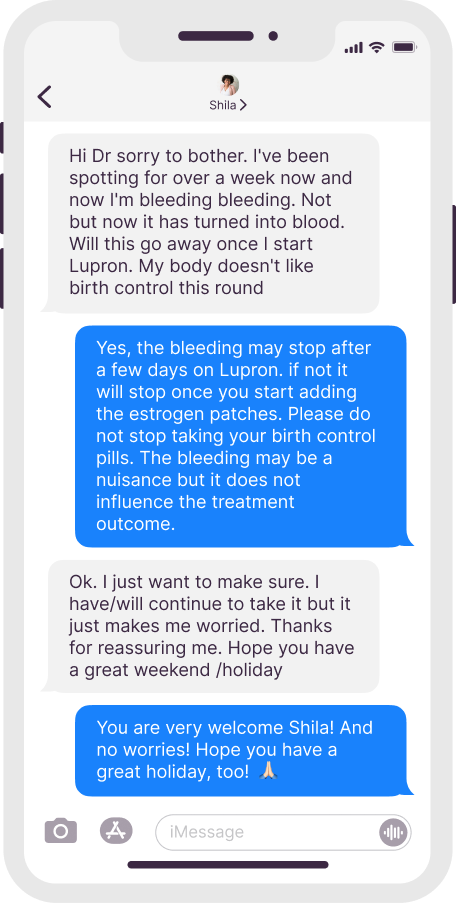
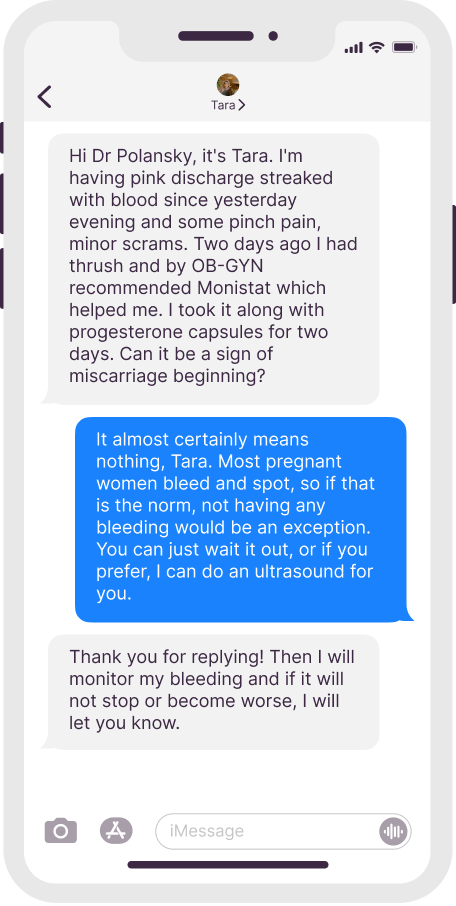
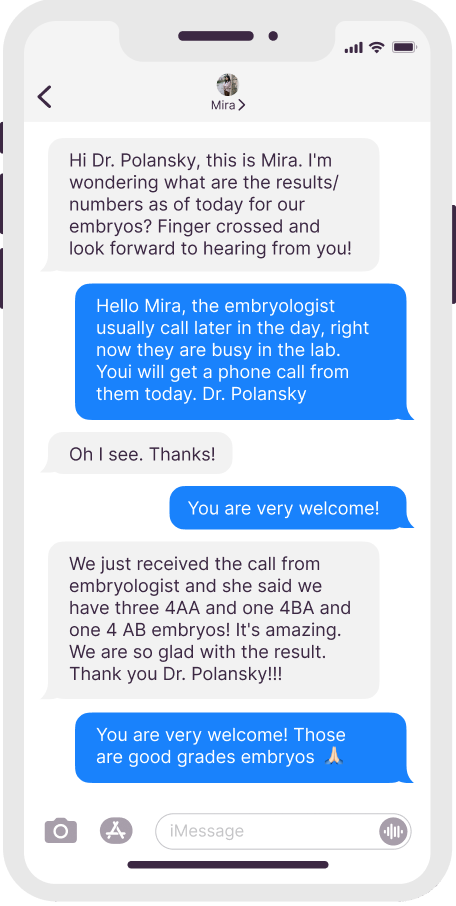



Initial Appointment Questions
When you call to schedule your consultation, one of our Front Office Coordinators will ask you a short series of questions regarding your reproductive history.
Patients’ Thank You Cards

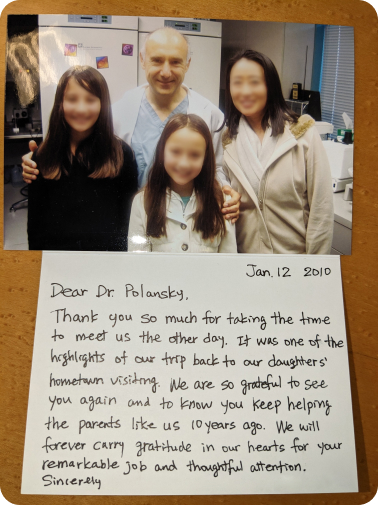

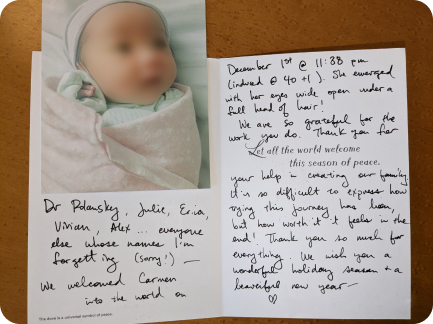



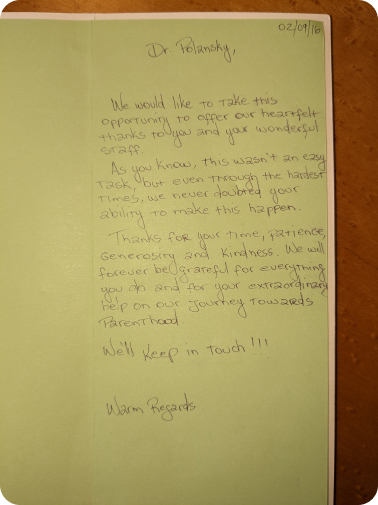

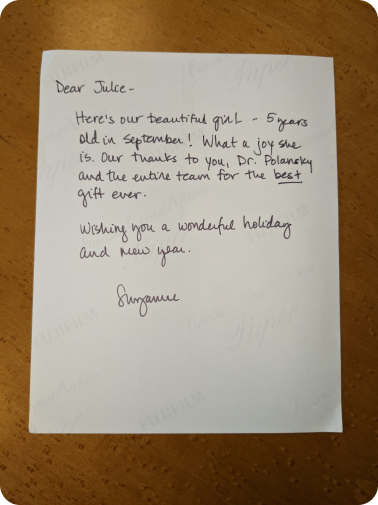

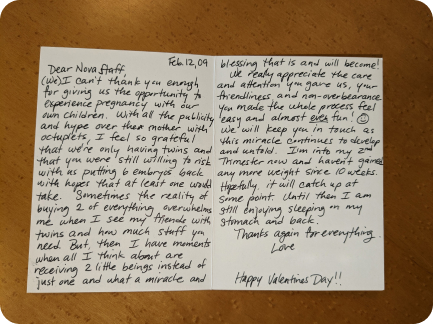






Your Initial Visit at Bay IVF
Attending a new patient appointment at a fertility clinic can be stressful. Our primary objective is to ensure that your initial visit is friendly and relaxing. We encourage you to ask questions at every step of the process.

1 — When You Arrive
You will be welcomed by one of the clinic receptionists. One of our nurses will measure your height and weight and take your blood pressure

2 — Meet Your Doctor
Dr. Polansky will ask you a series of clarifying questions and then provide you with a summary of the factors contributing to your infertility

4 — Exam Room
One of the nurses will escort you to an examination room. Your examination will begin with listening to your lungs and heart

3 — Ask Your Questions
You will then have a discussion with him about the most suitable reproductive treatment(s) for you. During this time, you will have the opportunity to ask any questions you may have

5 — Ultrasound of the Ovaries
The next step is a pelvic ultrasound to examine the uterus and ovaries. This ultrasound will help determine the number of antral follicles present within the ovaries

6 — Financial Part
Following that, you will have a discussion with one of the financial advisors regarding the financial aspects of your treatment, including potential treatment financing options

8 — Support 24/7
If you have any questions after leaving the clinic, please feel free to reach out to us via phone call, text, or email. Open and discreet communication is an integral part of the care we provide at Bay IVF

7 — What About Time?
Your entire visit is expected to last approximately one hour


Schedule Your Initial Consultation With Dr. Polansky
Online (No Cost) or In-Person
Call or Text Us: 650-322-0500
You can also complete the form below to request your initial consultation


Still Have Questions?
We understand that this is a significant decision, and it is important to us that you feel truly comfortable









